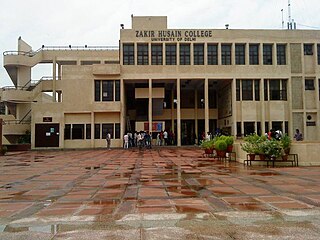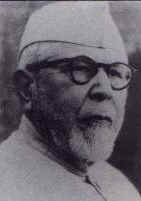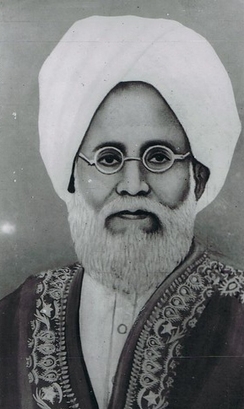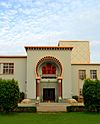Related Research Articles

Sir Syed Ahmad Khan, also spelled Sayyid Ahmad Khan, was an Indian Muslim reformer, philosopher, and educationist in nineteenth-century British India. Though initially espousing Hindu–Muslim unity, he later became the pioneer of Muslim nationalism in India and is widely credited as the father of the two-nation theory, which formed the basis of the Pakistan movement. Born into a family with strong ties to the Mughal court, Ahmad studied science and the Quran within the court. He was awarded an honorary LLD from the University of Edinburgh in 1889.

Jamia Millia Islamia is a central university located in New Delhi, India. Originally established at Aligarh, United Provinces during the British Empire in 1920, it moved to its current location in Okhla in 1935. It was given the deemed status by University Grants Commission in 1962. On 26 December 1988, it became a central university.
The Punjab cricket team is a first-class cricket team that represents the Indian state of Punjab. They have qualified for only one Ranji Trophy semi-final in the last five seasons and made it to the final in the 2004–05 tournament, where they lost to Railways in the first innings. They also play in other domestic cricket tournaments in India. They have only been winners of the Ranji Trophy once, in the 1992–93 season.
The All India Muhammadan Educational Conference was an organisation promoting modern, liberal education for the Muslim community in India. It was founded by Sir Syed Ahmed Khan, also the founder of the Aligarh Muslim University. All India Mumammadan Educational Conference was the origin of the All-India Muslim League. The Muslim League was born in the 20th session of All India Muhammadan Educational Conference, which was established by Syed Ahmed Khan in Aligarh in 1886. Muhammadan Educational Conference used to hold its annual meetings in various cities where, by the co-operation of local Muslims, steps were taken for the progress of education.
The Scientific Society of Aligarh was a literary society founded by Sir Syed Ahmad Khan at Aligarh, India. The main objectives of the society were to translate Western works on arts and science into vernacular languages and promote western education among the masses.
The Indian cricket team touring England and the British Isles in the summer of 1911 was the first all-Indian team to tour the country. The team was led by the then 19-year old Maharaja of Patiala Bhupinder Singh and had representation from the Parsees, Hindus, and the Muslims. The team had limited success winning only two amongst the 23 matches that they played on the tour.

Zakir Husain Delhi College, founded in 1696, is the oldest existing educational institution in India, and is a constituent college of the University of Delhi, accredited with NAAC 'A++' grade. The college comprises an area of 150 acres. The college is situated in south campus of University of Delhi It has had a considerable influence on modern education as well as Urdu and Islamic learning in India, and today remains the only Delhi University college offering BA (Hons) courses in Arabic and Persian.

Ibn Sina Academy of Medieval Medicine and Sciences (IAMMS) is a trust registered under the Indian Trusts Act, 1882. Mohammad Hamid Ansari, former vice-chancellor of Aligarh Muslim University, Aligarh, formally inaugurated it on 21 April 2001. Department of AYUSH, Ministry of Health and Family Welfare, Government of India gave accreditation to the academy in 2004 and promoted it as 'centre of excellence' in 2008. Membership of the academy is open to anyone who has an interest in the academy's activities particularly on history of medicine and history of science. Being a charitable organization, donations to the Academy are also exempted from Income Tax under section 80G of the Income Tax Act 1961.

Abdul Majeed Khwaja was an Indian lawyer, educationist, social reformer and freedom fighter from Aligarh. In 1920, he along with others founded Jamia Millia Islamia and later served its vice chancellor and chancellor.
Syed Afzal Ali was a famous personality from Bulandshahr. Four of his sons were bestowed with the title of Khan Bahadur by British India, a rare distinction in a family of Indian history.
Khan Bahadur Syed Ali Hasan was the captain of the 'MAO College Cricket Club', Superintendent of Police, Deputy Inspector General of Police and Inspector-General of Police in India. In 1930, he was knighted with the title of Khan Bahadur by British India.
Al-Jame-atul Islamia is an Islamic seminary of Sunni-Barelvi Muslims in India. It is located in Raunahi, District. Ayodhya, near Lucknow, in the north Indian state of Uttar Pradesh in India.
Masud Husain Khan was an Indian linguist, the first Professor Emeritus in Social Sciences at Aligarh Muslim University and the fifth Vice-Chancellor of Jamia Millia Islamia, a Central University in New Delhi.

Aligarh Muslim University is a public central university in Aligarh, Uttar Pradesh, India, which was originally established by Sir Syed Ahmad Khan as the Muhammadan Anglo-Oriental College in 1875. Muhammadan Anglo-Oriental College became Aligarh Muslim University in 1921, following the Aligarh Muslim University Act. It has three off-campus centres in AMU Malappuram Campus (Kerala), AMU Murshidabad Centre, and Kishanganj Centre (Bihar).
The Aligarh Movement was the push to establish a modern system of Western-style scientific education for the Muslim population of British India, during the later decades of the 19th century. The movement's name derives from the fact that its core and origins lay in the city of Aligarh in Central India and, in particular, with the foundation of the Muhammadan Anglo-Oriental College in 1875. The founder of the oriental college, and the other educational institutions that developed from it, was Sir Syed Ahmed Khan. He became the leading light of the wider Aligarh Movement.
Malik Ahmed Khan, known as Ahmed Khan, was a Pakistani cricket player and umpire. His first-class playing career spanned from 1932 to 1950, with all but one match coming prior to the partition of India in 1947. He made his first-class umpiring debut in 1953, and continued until 1973, having officiated in various Pakistani domestic competitions.

Mamluk Ali Nanautawi was an Indian Sunni Muslim scholar who served as the Head Teacher of Arabic language at the Zakir Husain Delhi College. His notable students include Muhammad Qasim Nanautawi, Rashid Ahmad Gangohi and Muhammad Yaqub Nanautawi.

This bibliography of Shibli Nomani is a selected list of generally available scholarly resources related to Shibli Nomani, a poet, philosopher, historian, educational thinker, author, orator, reformer, critic of orientalists and Islamic scholar from Indian subcontinent during the British Raj, regarded as the father of Urdu historiography. He didn't write an autobiography during his lifetime. However, he bequeathed it to his disciple Sulaiman Nadvi. Accordingly Sulaiman Nadvi composed Hayat-e-Shibli in 1943. This list will include his biographies, theses written on him and articles published about him in various journals, newspapers, encyclopedias, seminars, websites etc. in APA style.

The history of Aligarh Muslim University begins with the Aligarh movement, which was a movement to establish a Western style of education for the Muslims of British India. The movement was pioneered by Sir Syed Ahmed Khan, who founded the Muhammadan Anglo Oriental College in Aligarh. Sir Syed retired at Aligarh, and undertook the charge of raising funds for the college, and supervising the construction of the campus.
References
- ↑ Majumdar, Boria (18 October 2013). Cricket in Colonial India 1780 – 1947. Routledge. ISBN 9781317970132.
- ↑ Oborne, Peter (9 April 2015). Wounded Tiger: A History of Cricket in Pakistan. Simon and Schuster. ISBN 9781849832489.
- ↑ "Women's College of Aligarh Muslim University. TwoCircles.net". twocircles.net. 11 July 2009. Retrieved 4 November 2015.
- ↑ "The Cricketer - CricketArchive - The Oracle". stats.thecricketer.com. Archived from the original on 17 November 2015. Retrieved 4 November 2015.
- ↑ "CA details". CricketArchive. Retrieved 14 November 2015.
- ↑ "Pakistan Cricket - 'our cricket' website". www.pcboard.com.pk. Archived from the original on 17 November 2015. Retrieved 5 November 2015.
- ↑ Guha, Ramachandra (10 October 2014). A Corner of a Foreign Field: The Indian History of a British Sport (New and Updated ed.). Penguin Books Limited. ISBN 9789351186939.
- ↑ "First-class matches played by Aligarh Muslim University Past and Present". CricketArchive. Retrieved 30 March 2017.
